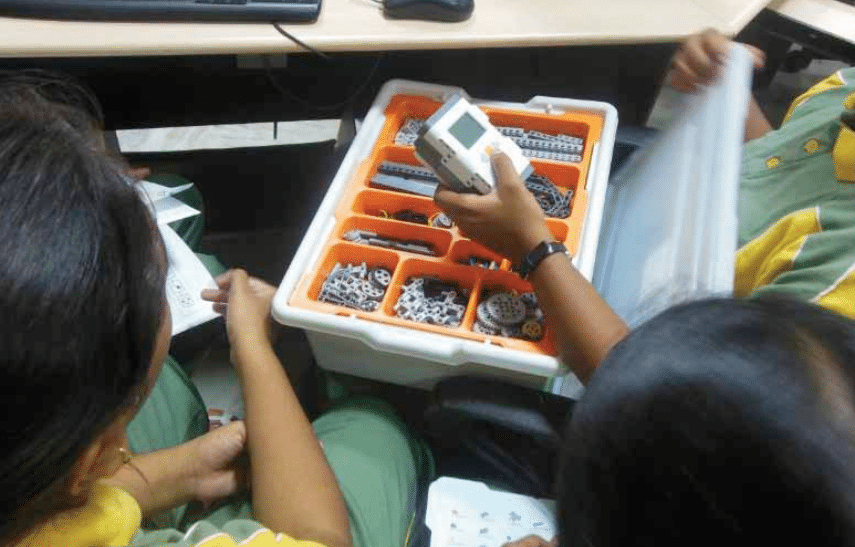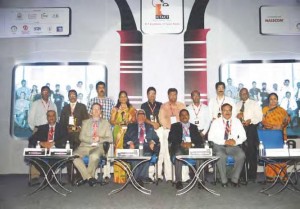 Industry – Academia Interaction with the focus on Skill Requirement for a Paradigm Shift
Industry – Academia Interaction with the focus on Skill Requirement for a Paradigm Shift
ICT Academy of Tamil Nadu (ICTACT) is organizing a series of conference titled “ICTACT BRIDGE” a platform for all the stake holders in the education eco-system to discuss on improving the Industry-Institute collaboration, thereby creating a vibrant industry relevant education scenario in the country. This event is being supported by Government of Tamil Nadu and conducted in association with NASSCOM. For the 7th time in the row ICT Academy of Tamil Nadu successfully conducted ICTACT BRIDGE conference. The conference addressed the pressing factors challenging employability with focus on 21st century skills for Education, employability, and Entrepreneurship on 20th Feb 2013 at Chennai Trade center, Nadambakkam. The event w as supported by ELCOT, EDI Chennai, TANSACS TNSDM, STPI, FICCI and TiE. ICTACT BRIDGE 2013 Chennai edition featured powerful sessions and tracks to address specific stakeholder issues with focused themes including Leadership in Building World Class Institutions, The 21st Century Skills for Teachers, Skill Development and Employability, Conclave on Recruitment Trends 2013 followed by ICTACT Academic Partner Excellence Awards 2013.
The conference was represented by a multitude of key stakeholders from Academia, Corporate, Government and Media. The Academia participants included academic leaders, the teaching fraternity, research community, placement officers etc. The Corporate participants included corporate executives, senior management members, technical executives, etc.
A team of eminent experts from the industry and academia are part of the ICTACT Bridge committee, are leading the conference, provide expert guidance, finalise the theme and framework of the conference and be part of various activities of the conference thereby making the conference a real bridge between the industry and academia. The conference was not only a chance to hear from those leaders and brainstorm for the future, but an opportunity for the academia to network with corporate. BRIDGE 2013 – Chennai Edition witnessed around 1160 participants from 347 colleges and various corporate.
 K Ganesan Global Head, Talent Acquisition, while giving the welcome address stressed on the point that the education ecosystem should fine tune its learning system and the syllabus to get itself updated to the 21st century education. The syllabus should be made student centric with active learning. Education through Internet should be facilitated. He quoted that ‘21st century education is not a Sage on the Stage but a Guide by the Side.”
K Ganesan Global Head, Talent Acquisition, while giving the welcome address stressed on the point that the education ecosystem should fine tune its learning system and the syllabus to get itself updated to the 21st century education. The syllabus should be made student centric with active learning. Education through Internet should be facilitated. He quoted that ‘21st century education is not a Sage on the Stage but a Guide by the Side.”
 Thiru Atul Anand, IAS, Managing Director, ELCOT said, “ The government will ensure the access of IT to every nook and corner of the state. He advised that the academia should have an open mindset and accept the new trends which will help them to adopt for the 21st century education.”
Thiru Atul Anand, IAS, Managing Director, ELCOT said, “ The government will ensure the access of IT to every nook and corner of the state. He advised that the academia should have an open mindset and accept the new trends which will help them to adopt for the 21st century education.”
 Thiru Kumar Jayant, IAS, Secretary – Project Director – Tamil Nadu Aids control Society opened his speech by requesting the college to understand the input of the student. The students though have a routing exam system and score high marks are not competent enough to face the demands of the industry. The students are very poor in application skills, but have great skills in memorising and scoring great marks. College is where more freedom should be given to the students and there should be mechanism to suppress the pressure of students. All colleges should have orientation programs. Reading books beyond the academic curriculum should be made mandatory in all institutions. This habit will fetch great difference among the students and improve their communication skills in the long run.
Thiru Kumar Jayant, IAS, Secretary – Project Director – Tamil Nadu Aids control Society opened his speech by requesting the college to understand the input of the student. The students though have a routing exam system and score high marks are not competent enough to face the demands of the industry. The students are very poor in application skills, but have great skills in memorising and scoring great marks. College is where more freedom should be given to the students and there should be mechanism to suppress the pressure of students. All colleges should have orientation programs. Reading books beyond the academic curriculum should be made mandatory in all institutions. This habit will fetch great difference among the students and improve their communication skills in the long run.
 David J Gainer, Public Affairs officer US consulate, Chennai spoke about the values of the Indian education system. He stated that they will introduce 100 community colleges in India. He mentioned that Indian students are working all over the World in all Top MNC’s in all sectors; it is the educational background which makes this possible. He stated that more a half a million Indians travel to US every year. There are strategies framed for the collaboration of the Indian and the US educational institutions.
David J Gainer, Public Affairs officer US consulate, Chennai spoke about the values of the Indian education system. He stated that they will introduce 100 community colleges in India. He mentioned that Indian students are working all over the World in all Top MNC’s in all sectors; it is the educational background which makes this possible. He stated that more a half a million Indians travel to US every year. There are strategies framed for the collaboration of the Indian and the US educational institutions.
Thiru P Murari, IAS (Retd), Advisor to FICCI President & Former Secretary to President of India
 Thiru Murari started his speech by stating that he is very much delighted to be in ICTACT Bridge conference. Not only IT but teaching skills are enhanced by taking such collective initiative. Eighty percent of the people who emerge from various institutions are still not employable. The State skill development is established to upgrade the skills and make them employable. We have to look into this problem very urgently. What we need to do is to develop and foster the entrepreneurship spirit among the students. Convert the job seekers into job creators. Risk taking ideas should be promoted. Entrepreneurship cell should be created in every college with partnership from corporate and effectively utilized for the growth of the students. Another important issues is the innovative spirit of the students, because of this the patent registration in India is very low. He finally ended his speech by quoting about the entrepreneurship talent hunt organised by FICCI and US embassy. The Closing session was given by Crazy Mohan and he explained about how skill development has helped him throughout his career. He shared his experience and how his teachers have been an important inspiration for his success. He finally concluded that everyone should nurture a skill which will help them through their lifetime.
Thiru Murari started his speech by stating that he is very much delighted to be in ICTACT Bridge conference. Not only IT but teaching skills are enhanced by taking such collective initiative. Eighty percent of the people who emerge from various institutions are still not employable. The State skill development is established to upgrade the skills and make them employable. We have to look into this problem very urgently. What we need to do is to develop and foster the entrepreneurship spirit among the students. Convert the job seekers into job creators. Risk taking ideas should be promoted. Entrepreneurship cell should be created in every college with partnership from corporate and effectively utilized for the growth of the students. Another important issues is the innovative spirit of the students, because of this the patent registration in India is very low. He finally ended his speech by quoting about the entrepreneurship talent hunt organised by FICCI and US embassy. The Closing session was given by Crazy Mohan and he explained about how skill development has helped him throughout his career. He shared his experience and how his teachers have been an important inspiration for his success. He finally concluded that everyone should nurture a skill which will help them through their lifetime.







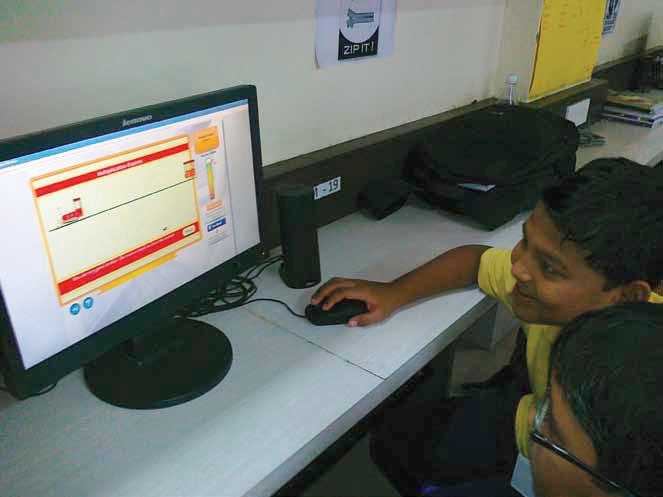 Sreenarayanan PC, Principal, Podar International School, Ahmedabad, shares his experience with Math labs
Sreenarayanan PC, Principal, Podar International School, Ahmedabad, shares his experience with Math labs Teachers find these labs very userfriendly and easy to understand. These labs help them in preparing customised worksheets and assignments and multiple options to bring in interactivity in the classroom. Students in the school feel that it makes the classroom come alive with thousands of ready-to-use activities and customised worksheets in minutes.
Teachers find these labs very userfriendly and easy to understand. These labs help them in preparing customised worksheets and assignments and multiple options to bring in interactivity in the classroom. Students in the school feel that it makes the classroom come alive with thousands of ready-to-use activities and customised worksheets in minutes.
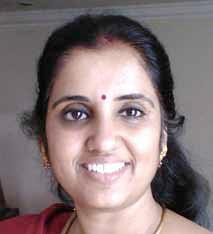 Bharathy Bharadwaj, Founder & CEO of Concept Learning Technologies Pvt Ltd/Math Buddy LLC
Bharathy Bharadwaj, Founder & CEO of Concept Learning Technologies Pvt Ltd/Math Buddy LLC With Mathematics playing a dynamic role in our lives, it is evident that applications of Mathematics are advancing at a spectacular rate. However, often students are found struggling with mathematical concepts. When teaching relies on generic formulae, theorems and concepts, students lose interest and find Mathematics dull and boring. This results in lower grades, eventually leading to a ‘Math phobia’ among students. The use of boards, notebooks and instructional learning often do not address the Math needs of a class of diverse students. For those students who require experimentation and visualisation, a variety of interactive teaching methods are needed.
With Mathematics playing a dynamic role in our lives, it is evident that applications of Mathematics are advancing at a spectacular rate. However, often students are found struggling with mathematical concepts. When teaching relies on generic formulae, theorems and concepts, students lose interest and find Mathematics dull and boring. This results in lower grades, eventually leading to a ‘Math phobia’ among students. The use of boards, notebooks and instructional learning often do not address the Math needs of a class of diverse students. For those students who require experimentation and visualisation, a variety of interactive teaching methods are needed.
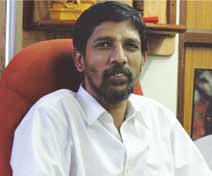 By Prof Raghu Raman, Director, Center for Research in Advanced Technologies for Education (CREATE), Amrita University
By Prof Raghu Raman, Director, Center for Research in Advanced Technologies for Education (CREATE), Amrita University

 Jasvinder Singh, Chief Executive Officer, Words Worth shares his insight on how English language Labs breaking learning barriers
Jasvinder Singh, Chief Executive Officer, Words Worth shares his insight on how English language Labs breaking learning barriers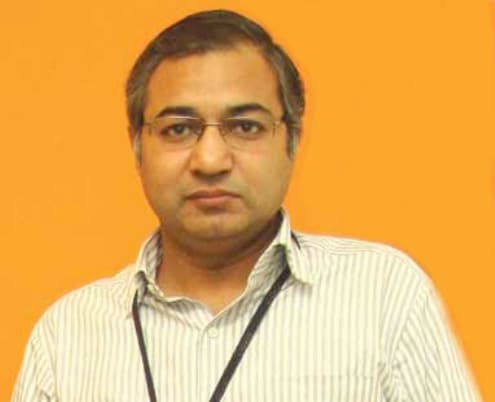 Vivek Agarwal, CEO, Liqvid
Vivek Agarwal, CEO, Liqvid
 Principal: S Harihara Sudhan
Principal: S Harihara Sudhan

